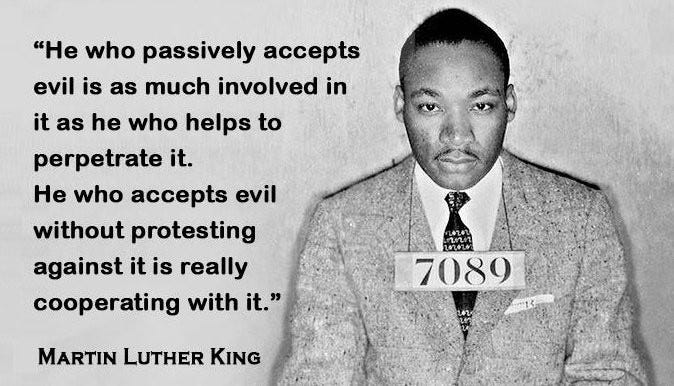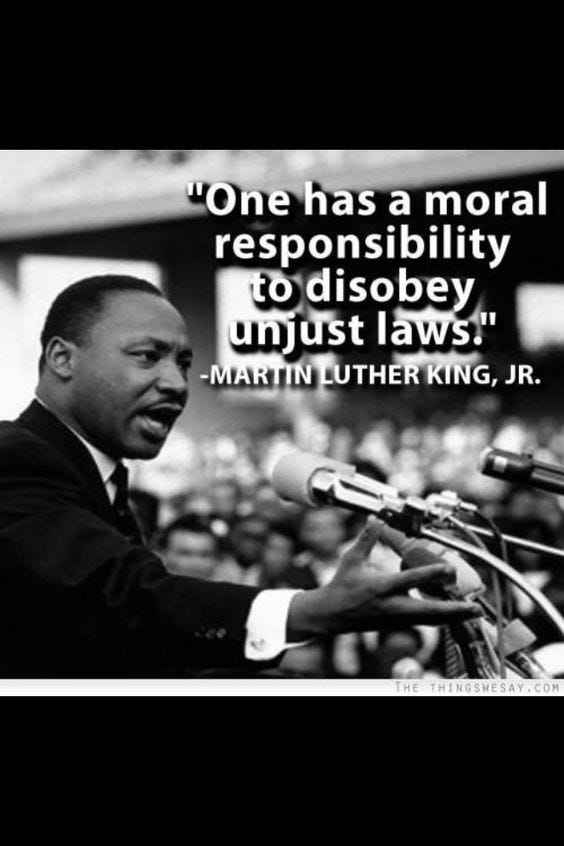DEI Matters More Than Ever
I better not see Meta, Ford, or Walmart posting MLK Jr quotes today
Note from the author:
This piece was originally written on January 20, 2025, before the full extent of the political and corporate backlash against DEI had unfolded.In the months since, we’ve seen even more rollbacks of diversity, equity, and inclusion programs. The term itself has become politicized, distorted, and, in some circles, deliberately dismantled. But I wrote this before all that happened. And now it’s more important than ever.
Dr. King’s legacy is not a quote carousel. It’s a demand for moral clarity and sustained action.
On this Martin Luther King Jr. Day, 2025, we’re about to see a lot of nice, friendly MLK Jr quotes shared to honor his legacy.
We’ll see them from companies and individuals actively working against his principles (I’m looking at your Meta, Walmart, and Ford).
Let’s put our money, time, and effort where our mouths are.
Dr. Martin Luther King Jr. is often remembered for his messages of unity and peace, but he also spoke with profound clarity about systemic injustice, economic inequality, and the moral failures of society.
On this MLK Jr Day, we cannot quote merely the times he advocated for things that are, by now, comfortable and familiar.
We must also consider and reflect on the times when he was provocative and challenged the status quo:
"We must recognize that we can’t solve our problem now until there is a radical redistribution of economic and political power."
(From his speech to the Southern Christian Leadership Conference, 1967)"Capitalism does not permit an even flow of economic resources. With this system, a small privileged few are rich beyond conscience, and almost all others are doomed to be poor at some level."
"I have almost reached the regrettable conclusion that the Negro's great stumbling block in the stride toward freedom is not the White Citizen's Counciler or the Ku Klux Klanner, but the white moderate, who is more devoted to 'order' than to justice."
(From his 1963 "Letter from Birmingham Jail")"There are forty million poor people here, and one day we must ask the question, 'Why are there forty million poor people in America?' And when you begin to ask that question, you are raising questions about the economic system, about a broader distribution of wealth."
(From his speech during the Poor People's Campaign, 1968)"True peace is not merely the absence of tension; it is the presence of justice."
(From his book Stride Toward Freedom: The Montgomery Story, 1958)"We as a nation must undergo a radical revolution of values. We must rapidly begin the shift from a thing-oriented society to a person-oriented society."
(From his 1967 speech, "Beyond Vietnam: A Time to Break Silence")
These statements reveal a side of Dr. King that is often sanitized in popular narratives. They show us his radical critique of systems of power and inequality, challenging us to confront uncomfortable truths about society and justice.
So until we solve the evils of capitalism, what can we do in our companies, our teams, and our workplaces to align with this moral imperative, ensuring our values and practices reflect a commitment to justice and fairness?
I’m not saying DEI is the only answer, but I’m worried about the rejection of those principles in the popular discourse.
We’re Not There Yet! Not Even Close
Let’s get it out of the way for anyone who says this is not a problem that needs to be solved.
1. Gender and Racial Pay Gap
In 2022, women earned approximately 82% of what men earned, a ratio that has remained relatively unchanged over the past two decades. (source: Pew)
The wage gap is more pronounced among women of color. For instance, Hispanic or Latina women earned about 58%, and Black women earned about 63% of what White men earned in 2021. (source: GAO)
The COVID-19 pandemic widened the gender wage gap for the first time in 20 years.
2. Occupational Segregation
Women are underrepresented in management positions, constituting about 41% of managers while making up approximately 44% of the total workforce. (source: GAO)
Black and Hispanic women are often concentrated in lower-paying industries and occupations, leading to significant economic disadvantages. (source: DOL)
3. Discrimination
Black employees not only earn less but also face adverse work environments, including limited access to workplace perks and dealing with poor management practices. (source: HBR)
A 2023 study by the Williams Institute found that 47% of LGBTQ+ employees reported experiencing discrimination or harassment at work.
Transgender and nonbinary employees faced even higher rates, with 55% reporting discrimination and 26% experiencing harassment.
Approximately 60% of nonbinary employees have experienced discrimination or harassment at work at some point in their lives, including being fired, not hired, or verbally, physically, or sexually harassed due to their gender identity
About 42% of working women in the U.S. report experiencing gender discrimination in the workplace, affecting their earnings, promotions, and job assignments. (source: Pew)
More than half (58%) of Latinx LGBTQ employees have faced discrimination or harassment at work during their lifetimes, including being fired, not hired, not promoted, or subjected to verbal, physical, or sexual harassment because of their sexual orientation or gender identity.
DEI is Good For Business
If you’re obsessed with shareholder value and not convinced by the moral imperative (or if you need some ammo to defend DEI programs at your company) allow me to share some academic research that makes a compelling business case for DEI programs:
1. Enhanced Financial Performance
Companies with diverse executive teams are more likely to outperform their peers financially. A McKinsey & Company report found that organizations in the top quartile for gender diversity on executive teams were 25% more likely to have above-average profitability.
2. Increased Innovation
Diverse teams bring varied perspectives, fostering creativity and innovation. Research shows that organizations engaged in DEI practices experience greater innovation and successful execution of ideas.
3. Access to a Broader Talent Pool
Emphasizing DEI allows companies to attract and retain talent from a wider range of backgrounds. According to Harvard Business School, 69% of recruiters and HR professionals believe their organizations commit to diverse hiring practices, yet only 47% think hiring managers are held to those standards.
4. Improved Employee Engagement and Retention
According to studies by Deloitte, McKinsey & Company, and Harvard Business Review, inclusive workplaces significantly contribute to higher employee satisfaction and lower turnover rates. Companies with inclusive cultures are more likely to retain top talent and have lower turnover rates than less diverse ones.
5. Better Decision-Making
Diverse teams consider a wider array of perspectives, leading to more informed and effective decisions. Diverse teams perform better than non-diverse teams, as varied viewpoints contribute to improved problem-solving and decision-making processes.
The Tides Are Shifting Against DEI
Lately, I’ve noticed a concerning trend among politicians and corporations to denigrate and undermine DEI initiatives.
This shift not only threatens the progress made toward workplace equality but also endangers the foundational principles of fairness and equal opportunity that Dr. King championed.
Several Fortune 500 companies have recently scaled back their DEI commitments in the wake of a U.S. Supreme Court decision in July 2023 that outlawed affirmative action in college admissions.:
Meta Platforms Inc. (parent company of Facebook, Instagram, and What’sApp)
McDonald's
Walmart
Ford
John Deere
Harley-Davidson
Companies Upholding DEI Commitments
Despite the backlash, some organizations continue to stand firm in their support for DEI:
Costco: The wholesale retailer maintains its DEI policies, emphasizing that such efforts are essential for attracting talent and fostering innovation.
Apple: The tech giant's board has advised shareholders to reject proposals aimed at eliminating its DEI programs, reaffirming its commitment to equal opportunity employment.
What Can Small Companies Do?
I work mostly with startups and SMBs. They don’t have multimillion-dollar DEI budgets. Here are some things to do to improve DEI at your workplace anyway:
Develop Inclusive Hiring Practices: Use blind resume reviews to minimize unconscious bias and post job openings on platforms that reach underrepresented groups.
Foster an Inclusive Workplace Culture: Establish clear anti-discrimination policies and create spaces for employees to share their experiences and feedback.
Provide DEI Training: Offer regular workshops on unconscious bias and inclusive leadership.
Ensure Pay Equity: Conduct regular audits to identify and close wage gaps.
Watch Diversity in Leadership and at Events: Check out your leadership page on your website: are they all white men? At your next event or webinar, keep an eye toward who you are promoting to speak. This is not merely for optics! I can’t stress that enough. It’s because your company and events will be BETTER.
What Can Individual Leaders Do?
Mind Your Own Team: All the things listed above are things you can do on your own team.
Educate Yourself: Read books, articles, and studies about systemic inequality and privilege.
Challenge Bias: Speak up when you witness discrimination or exclusion in the workplace.
Be an Ally: Amplify the voices of underrepresented colleagues and advocate for them.
Support Diverse Businesses: Choose to patronize or partner with businesses owned by marginalized groups.
Mentor and Sponsor: Offer guidance and opportunities to individuals from underrepresented backgrounds.
In Closing
My Substack is about work, so I’m looking at all this through the lens of what we can do in our workplaces. This is not meant to be an exhaustive solution to discrimination and bias in the workplace.
However, it is my fervent belief that the rollback of DEI initiatives poses a significant threat to the progress made in creating inclusive and equitable workplaces.
On this day, as we honor Dr. King's legacy, it's crucial for organizations and for us, as individuals, to reaffirm our commitment to DEI, recognizing that such efforts are not merely corporate responsibilities but moral imperatives essential for fostering a just and thriving society.






